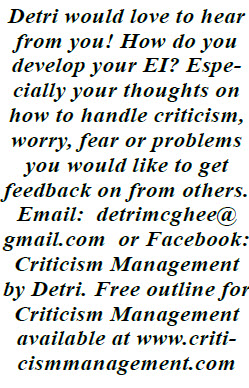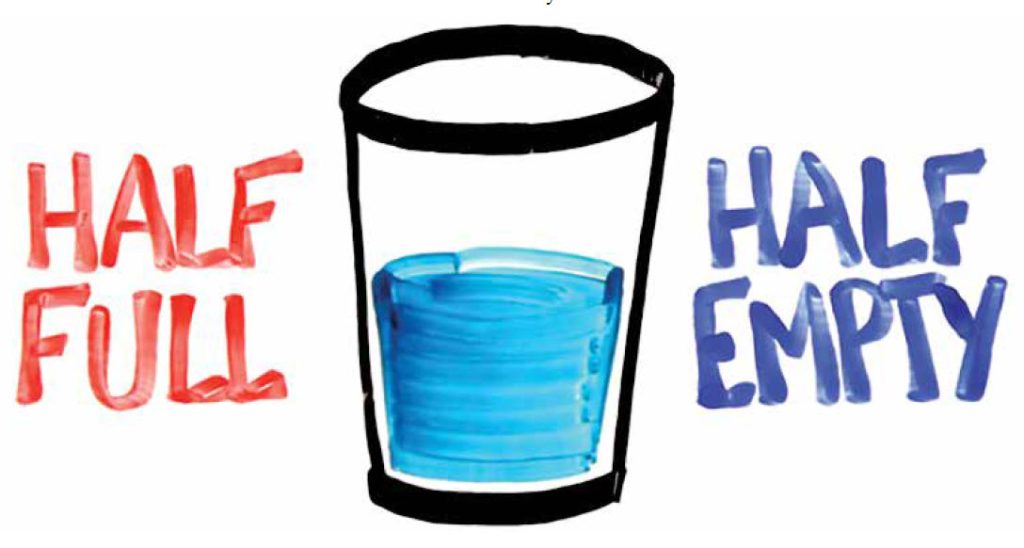 By: Detri L. McGhee, CLU, ChFC
By: Detri L. McGhee, CLU, ChFC
The TV comment was: “I suppose the answer depends on whether you see the glass as half full or half empty!” My friend (whom I consider my most negative, critical friend!) commented: “I really never have understood what that old saying means! Really! What’s the answer to that question supposed to reveal about the person answering?” The tone carried the idea that the person using this phrase was probably ignorant and wasting their time. Critical to the point of implying they were “stupid” for using it.
Since I have yet to fully learn the valuable lesson that I do NOT HAVE TO ANSWER every question/comment made, I tried to express how I understood that saying could give us a very clear picture of a person’s life choices.
“Well, I see it as I am the one who sees the glass as half full — thankful I have some water, appreciate the clean glass, etc. You, on the other hand, would describe it as half empty. Who took the rest of it? Why did they only put in half? Has someone already been drinking from that glass? I see the positive, and you see the negative. I see the advantages and you see the problems!”
Now, I couldn’t talk that way with just anyone, but there is the long-standing banter between us: My friend thinks I am too optimistic, and I think they are too pessimistic. Here’s the rub: I see my friend as negative, pessimistic, difficult, and always complaining and fussing. My friend sees me as avoiding the problems, and not facing reality, too optimistic. Together, we make a great team.
Usually we laugh at the familiar debate. However, Friend’s response to my honesty this time caught me off guard. Friend was actually a bit offended. “I am NOT negative! I am a realist! That glass is not half full nor is it half empty. It is half a glass of water!” Interesting observation.
Lessons to learn:
· Negative people often do not see themselves as “negative” but rather as a “realist.” Truly negative people grow older in various ways, but two of the most common: 1. They get more critical, grumpy, and impossible to please as they get older, stating the obvious problems and leaving others to solve them while they complain about it all. Or… 2. They work on their Emotional Intelligence growth and become excellent consultants and advice givers, learning to share their keen insights in positive, supportive, profitable ways.
· It is difficult for positive people to be around negative people for long, but if you can do it without letting your own mental health suffer, you can see life’s problems through them, and deal with those problems faster without making them a permanent part of your psyche.
 · Positive people also irritate negative people. They view them as too simplistic, living in an unreal world, not seeing the danger and problems clearly. Instead of trying to change them, keep them in appropriate places in your life. Learn from them when you can. Keep your distance when you feel down, or especially when you are pursuing a dream. They can be great assets when you are analyzing a dream. But when you are in the midst of establishing that well thought-out, clear vision (dream), stay around winners and fellow dream-enablers whenever possible. Better yet, choose carefully those with whom you share your vision. Less is usually more here.
· Positive people also irritate negative people. They view them as too simplistic, living in an unreal world, not seeing the danger and problems clearly. Instead of trying to change them, keep them in appropriate places in your life. Learn from them when you can. Keep your distance when you feel down, or especially when you are pursuing a dream. They can be great assets when you are analyzing a dream. But when you are in the midst of establishing that well thought-out, clear vision (dream), stay around winners and fellow dream-enablers whenever possible. Better yet, choose carefully those with whom you share your vision. Less is usually more here.
· If you feel a slight headache coming on, drink a full glass of water and take 5 long slow breaths while lowering your shoulders with each breath. You get mildly dehydrated before you feel thirsty. As you swallow, thank God that you have safe, abundant water at your complete disposal.
QUESTIONS OF THE DAY:
1. Is your glass half full or half empty?
2. Which do you do more often: praise or complain?
3. Do you feel compelled to give people advice, even if they don’t ask for it, or even want it, or do you more often find that people come to you for advice?
4. What EI skills do you use to enable you to keep your glass at least half full?
5. Who do you think is responsible for keeping your glass filled?
PRINCIPLE: When you share your opinion, consider how it could affect, influence, bless, or curse others. You are responsible for your words.
Detri would love to hear from you! How do you develop your EI? Especially your thoughts on how to handle criticism, worry, fear or problems. Email: detrimcghee@gmail.com or Facebook: Free outline for Criticism Management available at www.criticismmanagement.com.
By: Detri McGhee – CLU, ChFC






